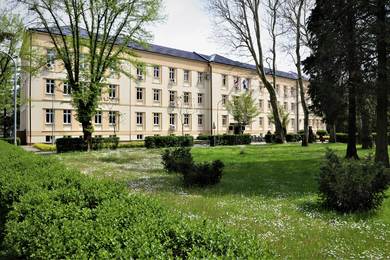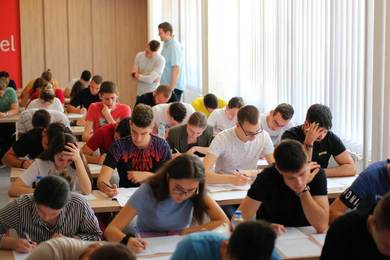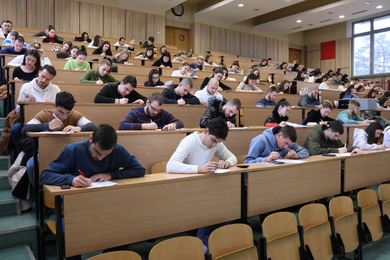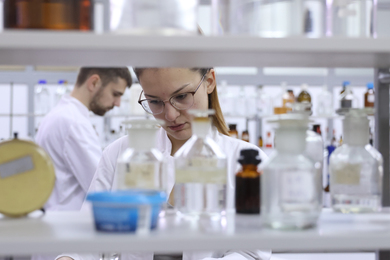
UNIVERSITY
About the University
Earlier university titles:
University of Banja Luka (7. 11. 1975 – 13. 12. 1979)
Đuro Pucar Stari University (13. 12. 1979 – 22. 4. 1992)
University of Banja Luka (22. 4. 1992 –)
The University of Banja Luka is the leading higher education and scientific institution in the Republic of Srpska and the second largest university in Bosnia and Herzegovina. Prior to its establishment on 7 November 1975, there were several colleges and faculties formed in this area. When it was established, the University comprised five faculties (Electrical Engineering, Technology, Mechanical Engineering, Law and Economics) and three junior colleges. The Faculty of Medicine was established in 1978, and other faculties later: Agriculture and Forestry in 1992, Philosophy in 1994. Architecture and Civil Engineering in 1996, Natural Sciences and Mathematics in 1996, Academy of Arts in 1999, Faculty of Physical Education and Sport in 2001, Philology, Political Science and Mining Engineering in 2009, and the Faculty of Security Science in 2017. Today, the University of Banja Luka comprises 16 faculties, the Academy of Arts and the Institute of Genetic Resources.
Classes are offered in 66 first-cycle study programmes, 64 second-cycle study programmes (and two combined study programmes), and 13 third-cycle study programmes (and one combined study programme). Most of the study programmes follow the three-cycle model of 4+1+3, while some faculties follow the 3+2+3 model as well.
At the University of Banja Luka there are currently around 15 000 students from all parts of the Republic of Srpska, but also from abroad. Most faculties of the University of Banja Luka are placed in two university campuses, situated near the banks of the Vrbas river, near the city centre. The campuses include student dormitories with cafeterias, sports courts, student clubs and the University Computer Centre. The University of Banja Luka has all the requisite space, from classrooms and halls, through reading rooms and libraries, to laboratories and computer rooms.
There is around 16 000 m2 of classroom area, and around 10,000 m2 of laboratory area. Most classrooms are equipped with video projectors and computers for viewing digital content. The University also has 20 computer rooms with non-stop access to broadband internet. The University's libraries hold over 200 000 books and are subscribed to a large number of scientific magazines. Since 2007, the University of Banja Luka has functioned as an integrated university, with its faculties, the Academy of Arts and the Institute of Genetic Resources as members.
The University is governed by the Steering Board, the Senate and the rector. The University’s highest academic body is the Senate. Pursuant to provisions of Article 53 of the Law adopted mid-2020, the Senate comprises the rector, vice-rectors, deans of the University’s members and the director of the Institute of Genetic Resources, as well as student representatives. Under the previous legislation, the composition of the Senate was different. It used to comprise nine members: one delegate from the ranks of academic staff from each member of the University, six student representatives, the rector and four vice-rectors. In accordance with the Statute of the University in Banja Luka, the rector represents the University and is responsible for lawful and efficient business activities of the University. The rector of the University of Banja Luka is prof. Radoslav Gajanin, PhD, full professor at the Faculty of Medicine. He was appointed as acting rector on 11 November 2017, and then elected as rector of the University on 21 March 2018. Professor Gajanin was appointed for the new mandate period 2022-2026, on 29 November 2021.
Future development vision
The 2017-2025 Development Strategy of the University of Banja Luka sets out strategic goals in areas of scientific research, the academic process, international cooperation, transfer of knowledge and technology into the economy, and financial self-sufficiency.
The University achieves European standards and contributes to the overall improvement of knowledge, and through science, research, internationalization and innovation, improves the teaching process and stimulates the economic growth of the society.
The University educates the future workforce, internationally competent in all scientific fields, capable to meet the demands of modern regional economy with expertise and quality.
The University promotes the highest international quality standards in science, research and education as the foundation of a successful teaching process and self-sufficiency. It is focused on integration into the European Research area (ERA) and adoption of good practices of the European Higher Education Area (EHEA). It educates future leaders and competent experts, thus taking on special responsibility in the development of the Republic of Srpska. The University promotes a society of high moral values, ethics and tolerance, building scientific, educational and cultural bridges within Bosnia and Herzegovina, in the region and across the world.
General strategic principles
The University is a reflection of the Republic of Srpska, creating and promoting science, research, innovation and culture, significant to the identity of the people who have been living on these lands for centuries. Without an awareness of identity and culture, without a clear connection between science and higher education, there can be no economic development in these areas. The University is developing further and is getting better positioned in global ranking lists.
Science and research are sources of knowledge, they are at the core of education and prerequisite to the self-sufficiency of higher education, as well as to the socio-economic and civilizational development of society. Keywords in the development of the University for the future are: scientific research, quality of the teaching process, student-oriented, internationalization, transfer of knowledge and technology, functional integration, self-sufficiency. The University has a new relationship between education and development, based on a new culture of research and development.
The purpose of the University is to create added value: for researchers and academic staff through the production of knowledge and research; for students through integration of new knowledge into modern study programmes; for all of society through the transfer of knowledge and technology into the economy. Therefore, the development of human resources as instigators and bearers of change in the process of building a better University is one of our most significant strategic goals. The University is a magnet for distinguished international experts, who are able to gather creative people with alternative ideas, experts who will encourage optimism and build trust among our universities. That way, the University can pave the way for broader social development and serve as a role model for other institutions.
The University bolsters the reputation of the Republic of Srpska by establishing the best possible international connections and contacts and promoting science and art in the region and Europe overall.
The teaching process and teaching models should promote the concept of student-oriented classes, with clearly set and defined learning outcomes, which should reflect the needs of the society and our economy. Persons with good higher education are the best investment for the future. They are welcome in their own environment, but at the same time they are the best ambassadors abroad.




